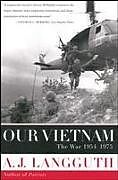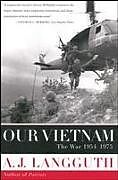Our Vietnam
Einband:
Kartonierter Einband
EAN:
9780743212311
Untertitel:
The War 1954-1975
Genre:
Geschichte
Autor:
A J Langguth
Herausgeber:
TOUCHSTONE PR
Anzahl Seiten:
768
Erscheinungsdatum:
12.03.2002
ISBN:
978-0-7432-1231-1
"If you thought there was nothing more to add to our knowledge of the Vietnam War, Jack Langguth's graphic narrative contains a wealth of new information and keen analysis. It is bound to take its place among the best books on the tragic conflict."
Autorentext
A. J. Langguth (1933–2014) was the author of eight books of nonfiction and three novels. After Lincoln marks his fourth book in a series that began in 1988 with Patriots: The Men Who Started the American Revolution. He served as a Saigon bureau chief for the New York Times, after covering the Civil Rights movement for the newspaper. Langguth taught for three decades at the University of Southern California and retired in 2003 as emeritus professor in the Annenberg School for Communication and Journalism.
Klappentext
Selected as a best book of the year by the "Los Angeles Times" and "The Washington Post, Our Vietnam" is a thoroughly documented, deftly written in-depth report on the 20-year conflict that forever changed not only Vietnam, but America as well. 40 photos. 2 maps.
Zusammenfassung
Winner of the Overseas Press Club's Cornelius J. Ryan Award for Best Nonfiction Book, the Commonwealth Club of California's Gold Medal for Nonfiction, and the PEN Center West Award for Best Research Nonfiction
Twenty-five years after the end of the Vietnam War, historian and journalist A. J. Langguth delivers an authoritative account of the war based on official documents not available earlier and on new reporting from both the American and Vietnamese perspectives. In Our Vietnam, Langguth takes us inside the waffling and deceitful White Houses of Kennedy, Johnson, and Nixon; documents the ineptness and corruption of our South Vietnamese allies; and recounts the bravery of soldiers on both sides of the war. With its broad sweep and keen insights, Our Vietnam brings together the kaleidoscopic events and personalities of the war into one engrossing and unforgettable narrative.
Leseprobe
Chapter One: Kennedy And Ho
1960
Dwight Eisenhower was a minute or two early walking out the front door of the White House because he wanted to greet his successor as soon as he arrived. It was the morning of December 6, 1960, four weeks after the presidential election, and Eisenhower had interrupted a vacation in Georgia to come back to Washington for his first meeting with the president-elect, John Fitzgerald Kennedy. The crowd gathering on Pennsylvania Avenue agreed that Ike looked ruddy and beaming, but his staff understood that his public smile, while it won elections, did not always reflect his mood. Eisenhower was fretting as he waited, concerned that Kennedy would pull up in a car filled with smug young aides still congratulating themselves on beating the Republicans.
During the recent campaign, Kennedy had spared the president direct attacks, but Eisenhower saw no reason to be grateful. Ike might have been seventy, the oldest man ever to hold the presidency and the victim of a heart attack, ileitis and a stroke. Yet he knew that if the Twenty-second Amendment to the U.S. Constitution had not barred him from a third term and he had chosen to run again, he could have beaten Kennedy or any other Democrat. Kennedy´s sharpest criticism had come in a campaign promise to "get the country moving again." Eisenhower might have resented the implication of stagnation and drift, but both he and Kennedy remembered the rancor between transition teams when Eisenhower succeeded Harry Truman in the White House and were determined to avoid any public show of hostility.
Jack Kennedy arrived promptly at 9 A.M. and made a good first impression by showing up with only a driver at the wheel of his cream-colored Lincoln. And he came hat in hand. Kennedy generally avoided headgear since none improved his appearance more than his own thatch of reddish-brown hair. Today, however, to show respect for the president, he was carrying a narrow-brimmed gray felt.
Kennedy climbed the six steps and shook Eisenhower´s hand. To Ike´s cordial welcome, he replied quietly, "It´s good to be here." Although Kennedy, at forty-three, was the youngest man ever to win the presidency, Ike detected no youthful arrogance as they toured the White House kitchens and the swimming pool. When they settled down to talk in the Oval Office, the president had to admit that Kennedy displayed an impressive mastery of the topics they had agreed to cover.
Their agenda had been prepared by George Ball, a State Department veteran, who had drafted a version for Kennedy and then revised it after the White House sent over its list of subjects Eisenhower wanted to discuss. Ike proposed nine items, opening with the question of sharing nuclear weapons with America´s European allies. Laos, a small but irksome country in Southeast Asia, ranked second on the Eisenhower agenda. It hadn´t appeared on Ball´s list at all.
One key to Jack Kennedy´s political effectiveness was his ability to listen attentively to an argument, ask probing questions and conclude a meeting by conveying his pleasure in the conversation -- all the while giving no hint of what he might decide. It was a reserve that had protected him as a sickly youngster growing up in a household that celebrated rude good health. Kennedy had shielded his sensitivity from Joseph Kennedy, his overwhelming father, and young Joe, his older brother, until his reticence had become ingrained. By the time Jack Kennedy ran for president, he was adept at maintaining options and resisting decisions. Early in the 1960 campaign, he had called on a group of Harvard professors to develop platform promises that would win him votes without tying his hands once he was elected.
In private conversation, Kennedy could rely on an indefinable aura -- journalists were labeling it "charisma," Greek for a power conferred by the gods -- that left his companions convinced that an enduring bond had been forged. Older men took his close attention for deference; men of every age came to feel real affection for this rather remote young millionaire.
With women, his combination of detachment and ruffled good looks served Jack Kennedy even better. During the recent campaign, Eleanor Roosevelt had expressed misgivings about Kennedy´s youth and about the influence of his father, whose isolationist views had alienated a generation of Roosevelt liberals. But even the Democrats´ beloved dowager had paused in her attack to grant that young Kennedy had "an enormous amount of charm."
Kennedy´s charm was working that morning on Dwight Eisenhower. After an hour and a half together, they were joined by Eisenhower´s top cabinet officers for further discussion. Later in the day, Ike noted in his diary that his successor seemed to be "a serious, earnest seeker for information." But he couldn´t be sure that this inexperienced Democrat was taking seriously enough Eisenhower´s gravest concern -- the drain on America´s gold supply from too much overseas spending. "I pray he understands it," Ike wrote.
Working with Eisenhower´s staff, a fifty-two-year-old Washington attorney named Clark Clifford was handling day-to-day matters for Kennedy´s transition team. With the wavy blond hair and bland good looks of a minor movie actor, Clifford had come from St. Louis to transform himself into a Washington insider -- arranging Harry Truman´s weekly poker games, serving as an Eisenhower commissioner, defending a Republican secretary of the army against Joseph McCarthy. Although Clifford had backed a fellow Missourian, Stuart Symington, in the recent Democratic primary elections, Jack Kennedy continued to use him as his personal lawyer. After the election, Clifford urged Kennedy in a memorandum to stress publicly that he was going to appoint only those men with the highest qu…

Leider konnten wir für diesen Artikel keine Preise ermitteln ...
billigbuch.ch sucht jetzt für Sie die besten Angebote ...
Die aktuellen Verkaufspreise von 6 Onlineshops werden in Realtime abgefragt.
Sie können das gewünschte Produkt anschliessend direkt beim Anbieter Ihrer Wahl bestellen.
Loading...
Die aktuellen Verkaufspreise von 6 Onlineshops werden in Realtime abgefragt.
Sie können das gewünschte Produkt anschliessend direkt beim Anbieter Ihrer Wahl bestellen.
| # | Onlineshop | Preis CHF | Versand CHF | Total CHF | ||
|---|---|---|---|---|---|---|
| 1 | Seller | 0.00 | 0.00 | 0.00 |
